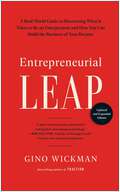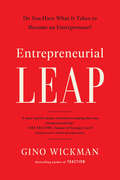- Table View
- List View
Entrepreneurial Financial Management: An Applied Approach
by Jeffrey R. Cornwall David O. Vang Jean M. HartmanThis fifth edition of a classic and comprehensive resource presents an applied, realistic view of entrepreneurial finance for today’s entrepreneurs, completely updated to address the latest trends and technologies. The book provides an integrated set of concepts and applications, drawing from entrepreneurship, finance and accounting, that will prepare aspiring entrepreneurs for the world they will most likely face as they start their new businesses. The contents are designed to follow the life cycle of a new business venture. Topics are presented in logical order, as entrepreneurs will likely face them as they begin the process of business start-up and move into growing the business. Both undergraduate and graduate students will appreciate the clear presentation of complex issues, and this book is an essential resource for budding entrepreneurs as well. A comprehensive spreadsheet financial template is included with the book, and an all-new case study provides questions that will help students learn the template as they proceed through the book. This tool allows for the application of many of the concepts to actual businesses and can be a valuable supplement to the process of developing a full business plan. The spreadsheet financial template is available for unlimited free downloads at Professor Cornwall’s blog site: www.drjeffcornwall.com.
Entrepreneurial Financial Management: An Applied Approach (100 Cases Ser.)
by Jeffrey R. Cornwall David O. Vang Jean M. HartmanNow in its sixth edition, this classic and comprehensive resource presents an applied, realistic view of entrepreneurial finance for today’s entrepreneurs. The book provides an integrated set of concepts and applications, drawing from entrepreneurship, finance, and accounting, that will prepare aspiring entrepreneurs for the world they will most likely face as they start their new businesses.The contents are designed to follow the life cycle of a new business venture. Topics are presented in logical order, as entrepreneurs will likely face them, from business start-up through to growing the business. Each chapter includes discussion questions and opportunities for application. PowerPoint slides and problem solutions are available for instructors. A comprehensive financial spreadsheet template is also included with the text, which allows for the application of the concepts to actual businesses and is a valuable supplement to the process of developing a full business plan. This new edition includes new examples throughout, an expanded discussion of the role of entrepreneurial financial management in business modeling, and updated current practices in bootstrapping and sources of financing.Entrepreneurial Financial Management will be a valuable resource for undergraduate and graduate students of entrepreneurship and budding entrepreneurs alike.
Entrepreneurial Governance in the Neoliberal Era: Local Government and the Automotive Industry (Routledge Studies in Urban Sociology)
by Oliver CowartAgainst the background of a growing tendency among state and local governments in the United States to vie against one another, spending public funds, and foregoing corporate tax revenues in order to attract private investment, this book offers an analysis of local economic development and business recruitment in the automotive industry. Asking why localities felt they could – and, more importantly, should – make deals with private capital in the first place, this book examines the shift toward entrepreneurial local governance from a global and historically informed perspective. Through a study of the 19 greenfield automotive assembly plants constructed in the United States during the neoliberal era, the author draws on interviews with corporate and government elites, to chart the connections between increasingly global competitive industry pressures and changing attitudes toward “incentivizing” private investment. Studying the development of an approach that has partially reoriented local governments away from managing localities and towards helping manage transnational capital flows by absorbing some of the increasing risk of long-term capital investment, Entrepreneurial Governance in the Neoliberal Era will appeal to scholars of sociology, politics, and urban studies with interests in globalization, the sociology of work and industry, the sociology of development, and neoliberal governance.
Entrepreneurial Icebreakers
by Julia Prats Marc Sosna Sylwia Sysko-RomańczukThis book presents key insights about the challenges and the approaches they applied. All companies are featured in 15 teachable case studies ready to use in entrepreneurship and strategy courses that represent a broad level of diversity with regard to countries, industries, topics, growth phases, challenges and internationalization strategies. "
Entrepreneurial Identity and Identity Work
by Richard T. Harrison Claire M. LeitchIdentities can potentially serve as powerful elements that both drive, and are shaped by, entrepreneurial actions. Entrepreneurial identity is a complex construct with multidisciplinary roots, and therefore there is scope to more fully enrich our theoretical understanding of identity and identity formation, at both individual and organizational levels, and their relationship to entrepreneurial processes, practices and activities. This book highlights two key features of contemporary research on entrepreneurial identity. First, to see it as a dynamic rather than a (relatively) fixed and unchanging feature, shaped by different life episodes. It is increasingly fluid, multilevel and multidimensional, comprising multiple subidentities rather than a univocal (and unchanging) self. As such, it has a profound effect not only on the way we feel, think and behave, but also on what we aim to achieve. Accordingly, it is vital that its dynamics are better understood, particularly in determining how actors behave in an entrepreneurial context. The book’s second focus is on identity work as the process through which entrepreneurial identities are formed and shaped, and the contributors demonstrate how the dynamics of identity formation relate to entrepreneurial outcomes in a range of individual and organizational contexts. This book was originally published as a special issue of Entrepreneurship & Regional Development.
Entrepreneurial Innovation and Leadership: Preparing For A Digital Future
by Paul Jackson Nancy Richter Thomas SchildhauerTaking the themes of entrepreneurship, start-ups, innovation and collaboration, this book seeks to answer the urgent question of how countries and companies can stay competitive in an ever-changing digital environment. The authors determine which entrepreneurial processes will work for whom and under what circumstances, presenting methodological implications for business research, start-ups and policy making. Examining the success of Germany as an innovation powerhouse, and comparing this with the USA, this edited collection provides valuable ideas for improving practice, facilitating start-up activity, and ultimately ensuring a country’s competitive edge.
Entrepreneurial Innovation in the International Business of Tourism (Routledge Critical Studies in Tourism, Business and Management)
by Pantea Foroudi María Jesús Jerez-JerezThis international case study book provides 28 expertly curated case studies on entrepreneurship and innovation in tourism, each with detailed implementation instructions for the instructor to maximise student participation and learning.The dynamic characteristic of the tourism industry under the influence of micro and macro environment factors requires future professionals to be equipped with appropriate skills and competencies to deal with change and development in real-life practices. Curated and developed by industry experts and practitioners, these case studies embody real-world scenarios with the aim of best preparing students for their future careers. This compelling set of case studies explores the dynamics of entrepreneurship in global context, analyses emerging markets and new business models, and elicits the implications of innovation and entrepreneurship in different contexts and within a transdisciplinary perspective. The cases illustrate innovation and entrepreneurship as an accelerator of tourism growth and development, under a sustainable perspective.With reflective questions throughout to aid both in-class discussion and self-study, this book is an ideal study resource for use in higher and vocational education, and its unique, teaching-led approach positions it as a vital study tool for instructors and students alike.
Entrepreneurial Innovation: Strategy and Competition Aspects (Studies on Entrepreneurship, Structural Change and Industrial Dynamics)
by Vanessa RattenThis book explores and asserts that there are many different types of innovation but in order to bring about fundamental change to society the innovation must be entrepreneurial. The aim of this edited book is to focus on different elements of entrepreneurial innovation in order to understand emerging issues and trends. This book shows how this enables an increase in research attention placed on how entrepreneurial innovation must have a strategic intent in order to facilitate societal change. The role of competition in enabling organizations to utilise innovation that is cutting edge is discussed with the goal of bringing together the disparate literature on entrepreneurship and innovation in terms of international competitiveness. This book presents at length examinations on how entrepreneurship can facilitate healthier strategy and competition in organisations and beyond.
Entrepreneurial Innovations, Models, and Implementation Strategies for Industry 4.0 (ISSN)
by Shivani Agarwal Geeta Rana Ravindra SharmaThis book explores the link between entrepreneurship and innovation, providing an understanding of the latest developments in the field. It explores numerous challenges to entrepreneurship, such as failures and socio-economic issues, and presents concepts, models, and implementation strategies for Industry 4.0.Industry 4.0 presents unique challenges and unique opportunities to entrepreneurs. Social, techno, and women’s entrepreneurship, among other business sectors and domains, are discussed in this new context. This book highlights the strategies of successful start-up organizations, focusing on the most critical factors for starting a new enterprise in today’s business environment, and provides efficient remedies for common problems. These strategies and solutions will help build a sustainable development model for developing economies and contribute to a global awareness of the entrepreneurship environment.Entrepreneurial Innovations, Models, and Implementation Strategies for Industry 4.0 is both a practical guide for new entrepreneurs to establishing start-ups and an enlightening collection of research for graduate students, postgraduate students, scholars, and academicians across all disciplines. Policymakers will also benefit from this book’s understanding of entrepreneurial ecosystems and their applications.
Entrepreneurial Knowledge, Technology and the Transformation of Regions: Entrepreneurial Knowledge, Technology And The Transformation Of Regions (Regions and Cities #68)
by Charlie Karlsson Börje Johansson Roger StoughIn recent years, policy makers have given much credence to the role of entrepreneurship in the transformation of regions. As a result, a new set of policy responses have emerged that focus on the support of new venture creation, small business growth and idea generation and commercialization. While there is a wealth of research about entrepreneurship in general, less attention has been given to the development of new tools and programs in support of entrepreneurial activities, and to the ways in which the emergence, the character and the types of entrepreneurship policies might differ between countries. In particular, the transatlantic perspective is of special interest because of the pioneering role of the United States in this area, and also due to the European Union's focus on economic competitiveness. The contributions included in this book explore the emergence of entrepreneurship policies from a transatlantic comparative perspective and address different aspects of entrepreneurship policies including local entrepreneurship policies and the relationship between knowledge-based industries and entrepreneurship policies.
Entrepreneurial Leadership im räumlichen Handlungskontext: Charakterisierung von entrepreneurial Leadern als Akteure in touristisch-sozialen Feldern (Entrepreneurial Management und Standortentwicklung)
by Stefanie HaselwanterAlpine Destinationen sind komplexe Gebilde, die ökonomische und soziokulturelle Strukturen vereinen. Sie sind eng mit der ansässigen Bevölkerung und dem lokalen Unternehmertum verknüpft. Unternehmerische Führungspersönlichkeiten, sogenannte ‚entrepreneurial Leader&‘, spielen eine Schlüsselrolle bei der Destinationsentwicklung. Während ‚Entrepreneurial Leadership&‘ als aufstrebender Forschungszweig vorwiegend auf organisationaler Ebene untersucht wurde, widmet sich dieses Buch der Charakterisierung von entrepreneurial Leadern im räumlichen Kontext alpiner Destinationen. Zur Analyse der Interaktionen von entrepreneurial Leadern werden feldtheoretische Ansätze herangezogen, welche neue Perspektiven auf die Strukturmuster in Destinationen eröffnen. Die Arbeit folgt einem konzeptionellen, explorativen Forschungsdesign und kombiniert methodisch Ansätze der Grounded Theory mit einer integrativen Literaturanalyse. Ziel ist es, entrepreneurial Leadership auf unterschiedlichen Handlungsebenen zu analysieren und ein Modell für entrepreneurial Leadership im touristischen Raum zu entwickeln. Daraus werden zentrale Thesen sowie theoretische und praktische Implikationen abgeleitet.
Entrepreneurial Leadership: A Practical Guide to Generating New Business
by Angelo MastrangeloReal-life examples from the author's experience illuminate a step-by-step plan that can help entrepreneurial leaders achieve their goals. * Suggests easy-to-follow principles for entrepreneurial leaders in all kinds of organizations based on the author's 40+ years of success leading enterprises in the business and nonprofit worlds * Combines principles of entrepreneurship and leadership into two groundbreaking models * Explains the fundamentals of entrepreneurial leadership in clear, readily understandable language * Shows the reader how to identify commercially viable opportunities versus opportunities that may not generate income * Takes readers inside the "Cola Wars" of the 1980s and 1990s, providing a glimpse into an industry that most people regularly patronize but of which they have no insider understanding * Uses real-life examples to show how entrepreneurial leadership has been practiced in unexpected places, including three U. S. presidencies
Entrepreneurial Leadership: Finding Your Calling, Making a Difference
by R. Paul Stevens Richard J. GoossenWhat does good theology have to do with good entrepreneurship? In this pioneering work, Richard Goossen and R. Paul Stevens have written what many are already declaring to be the essential resource for Christian entrepreneurial leadership, based on exhaustive research, practical experience and decades of teaching marketplace theology. Entrepreneurial Leadership addresses both the "how-come" and the "how-to," not only grounding the entrepreneurial calling in its proper source in the triune God but also providing practical guides for how to be an effective leader. Be inspired to find your calling and to make a difference in the marketplace, church and beyond.
Entrepreneurial Leadership: The Art of Launching New Ventures, Inspiring Others, and Running Stuff
by Joel PetersonMake a lasting impact by launching new initiatives, inspiring others, and championing innovative approaches with this from-the-trenches guide by trusted executive mentor, entrepreneur, and leadership expert Joel Peterson. Many leaders see their roles as presiders/managers, with a primary focus on keeping results consistent with past performance and on budget. These kinds of leaders make important contributions but rarely leave a mark on the businesses they serve. For those wanting to make a lasting impact, new skills are required. They need to learn to launch new initiatives, inspire others, and champion innovative approaches. Joel Peterson calls these higher-level leaders &“entrepreneurial leaders,&” and they create durable enterprises that deliver on their promise.After three careers, four decades of marriage and seven kids, and demanding roles as CFO, CEO, chairman, lead director, adjunct professor, founder, author, entrepreneur and investor, Joel Peterson is often sought as a mentor and coach by leaders and aspiring leaders. He has worked with all types of leaders and considers the entrepreneurial leader to be the highest level of influence.Peterson lays out a path to achieving this summit, with a series of leadership maps organized around the four essential basecamps on the path to Entrepreneurial Leadership:Establishing TrustCreating a Sense of MissionBuilding a Cohesive TeamExecuting and Delivering ResultsThese core philosophies, while easy to summarize, can be extremely difficult to implement. As Peterson says:&“This book of maps and mindsets is aimed at those who hope to lead others, help them achieve their best, break new barriers, change the status quo, create a legacy, develop a brand, and enjoy a life-altering experience.&”Let Entrepreneurial Leadership guide you on your journey.
Entrepreneurial Leap, Updated and Expanded Edition: A Real-World Guide to Discovering What It Takes to Be an Entrepreneur and How You Can Build the Business of Your Dreams
by Gino WickmanYou&’ve thought about starting your own business . . . but how can you decide if you should really take the leap? An entrepreneur depends on far more than just a great idea and a generous helping of luck. There&’s a lot on the line, and you have to ask yourself difficult questions: Do I have what it takes? Is it worth it? And how the heck do I do it? You need answers, not BS. This book has them. The updated edition of Entrepreneurial Leap will help you decide, once and for all, if entrepreneurship is right for you—and give you the tools you need to create a successful business. In this three-part book, Gino Wickman, bestselling author of Traction, reveals the 6 essential traits that every entrepreneur needs in order to succeed, based on real-life stories of entrepreneurs who have reached incredible heights. If these traits ring true for you, you&’ll get a glimpse of what your life would look like as an entrepreneur, learn how to avoid 8 critical mistakes, and determine what type of business best suits your unique skill set. What&’s more, Wickman provides a detailed road map to a better start-up, including 8 must do&’s to increase your odds of success, 9 stages of building your business, and 10 disciplines for managing and maximizing your energy. Packed with tools, tips, and exercises that will accelerate your path to start-up success, Entrepreneurial Leap is a simple and practical how-to manual for BIG results. Should you take the leap toward entrepreneurship? Find out today and let tomorrow be the first step in your new journey, whatever shape it may take.
Entrepreneurial Leap: Do You Have What it Takes to Become an Entrepreneur?
by Gino WickmanYou've thought about starting your own business . . . but how can you decide if you should really take the leap? There's a lot on the line, and you have to ask yourself difficult questions: Do I have what it takes? Is it worth it? And how the hell do I do it? You need answers, not bullshit. This book has them. Entrepreneurial Leap: Do You Have What it Takes to Become an Entrepreneur? is an easy-to-use guide that will help you decide, once and for all, if entrepreneurship is right for you—because success as an entrepreneur depends on far more than just a great idea and a generous helping of luck. In this three-part book, Gino Wickman, bestselling author of Traction, reveals the six essential traits that every entrepreneur needs in order to succeed, based on real-world startups that have reached incredible heights. If these traits ring true for you, you'll get a glimpse of what your life would look like as an entrepreneur. What's more, Wickman will help you determine what type of business best suits your unique skill set and provide a detailed roadmap, with tools, tips, and exercises, that will accelerate your path to startup success. Packed with real-life stories and practical advice, Entrepreneurial Leap is a simple how-to manual for BIG results. Should you take the leap toward entrepreneurship? Find out today and let tomorrow be the first step in your new journey, whatever shape it may take.
Entrepreneurial Learning City Regions: Delivering on the UNESCO 2013, Beijing Declaration on Building Learning Cities
by Judith James, Jean Preece and Raúl Valdés-CoteraThis book proposes an alternative strategy to improve and sustain prosperity, through the creation of an entrepreneurial culture in learning cities or city regions. The edited collection provides insights into how entrepreneurship, education, job creation and social inclusion can be aligned through entrepreneurial learning, in the context of territorial development. With rich and varied contributions from a wide field, including policy makers, entrepreneurs, an investment banker, leaders of universities and councils, the voluntary sector, scientists, educators and students, it reviews and assesses how learning cities and regions may become more prosperous by investing in the development of entrepreneurial skills throughout lifelong learning. Reinforced by examples on developing and retaining entrepreneurial people, this book contributes to our understanding of how entrepreneurial learning can be fostered in different city and city-region contexts. It makes an interesting contribution to the field in terms of mapping out complex issues and testing the practical validity of the concept, while also providing rich and insightful case studies centred on the Welsh experience with entrepreneurial learning city regions. The high quality international contributions demonstrate the new worldwide interest in developing an entrepreneurial culture for the benefit of a city or region, rather than an entrepreneurial mind-set for individual benefit. This fascinating subject will be of interest to many social scientists, policymakers, and practitioners. It will be found especially valuable for professionals involved in economic, inclusive and sustainable city or regional development.
Entrepreneurial Learning: Conceptual Frameworks and Applications
by Richard Harrison Claire M. LeitchThis book addresses the burgeoning interest in organizational learning and entrepreneurship, bringing together for the first time a collection of new papers dealing explicitly with entrepreneurial learning. Where past books have examined learning in a corporate context, Harrison and Leitch focus instead on the learning process within entrepreneursh
Entrepreneurial Learning: New Perspectives in Research, Education and Practice (Routledge Studies in Entrepreneurship)
by David Rae Catherine L. WangThis book explores the development of the rapidly evolving field of entrepreneurial learning by bringing together contributions from an international team of researchers, who offer new understanding of its emerging development and its potential scope for the future. Using the three domains of theory, education, and learning-in-practice, this book offers differing and complementary perspectives on entrepreneurial learning: Conceptual work which reviews and summarises prior work in the field and advances theoretical understanding of entrepreneurial learning research, enabling a review of the development of research in this area over time. Applied work around entrepreneurship education which develops understanding of teaching and learning practices in educational and institutional contexts. Exploration of learning in ‘real’ business contexts, including new venture creation, family business and small business development, and ‘intrapreneurial’ learning in larger organisations. Using global perspectives, originating from the different cultural contexts of the USA, UK, Nordic and Chinese perspectives, the chapters converge to address issues, questions and opportunities for the future development of entrepreneurial learning. This book will be of interest to educators and researchers in the areas of entrepreneurship, enterprise education and entrepreneurial development, as well as policy makers and business advice and support agencies.
Entrepreneurial Management
by Shivganesh BhargavaA prerequisite for good entrepreneurial management is an enterprising attitude on the part of the people involved. Productivity of an organization can only be improved with proper management. The influences of family, social institutions, governance and leadership also play a significant role in the management of an organization. Common managerial challenges such as competition, resource scarcity, shortage of power and capital, technology upgradation and cost of production require the attention of policy makers. Creating and developing an entrepreneurial mindset in people, would help an organization face all challenges to enhancing the life of a product in the marketplace. To motivate people and achieve growth, leaders are required to navigate both internal and external conflicts. Consequently, the role of entrepreneurial leadership and management becomes important for students as well as entrepreneurs. All these issues are dealt with in this volume on entrepreneurial management consisting of 14 papers, written by management professionals, faculty, research scholars, consultants and administrators.
Entrepreneurial Management in Small Firms
by Dr Ian ChastonExamining the crucial role of innovation and entrepreneurship in achieving growth and ongoing success in the small business sector, this book carefully examines the processes by which small businesses identify new opportunities, evolve appropriate marketing strategies, develop new products and services and successfully launch these into the market.<P> The text:<P> - Includes a dedicated chapter on social entrepreneurship and family firms<P> - Explores issues of Ethics and Corporate Social Responsibility<P> - Packed with supporting "real world" case studies including Apple's iPod, Facebook, Starbucks and YouTube to illustrate how entrepreneurial firms succeed. <P> - Learning features including learning aims, summaries, points for discussion, and further reading. <P> - Companion website with instructors' manual and PowerPoint slides and access to full-text journal articles for students. <P> Visit the Companion website at www.sagepub.co.uk/chaston
Entrepreneurial Marketing and International New Ventures: Antecedents, Elements and Outcomes (Routledge Studies in Entrepreneurship)
by Izabela KowalikThe book investigates the entrepreneurial marketing (EM) concept within the broader discipline of international entrepreneurship. The analysis of this concept, and designing a model of EM antecedents, elements, and outcomes that was tested on the basis of empirical studies covering companies from three European countries, explores and develops the field of international marketing and entrepreneurship. The book examines the role of entrepreneurial marketing in the internationalization processes of new ventures and adopts both qualitative and quantitative methods for analyzing the antecedents and characteristics of entrepreneurial marketing, as well as their relationships with internationalization activities and firms’ performances. It goes on to show how the application of entrepreneurial marketing may lead to an accelerated internationalization of companies originating from a transition market, as well as the Western-European markets. It addresses these topics with regards to entrepreneurial marketing and management and will be of interest to researchers, academics, managers, entrepreneurs, and students in the fields of international business, international marketing, and entrepreneurship.
Entrepreneurial Marketing for SMEs
by Luca Cacciolatti Soo LeeEntrepreneurial Marketing for SMEs contextualizes the practice of marketing amongst SMEs, and critically discusses major issues of Entrepreneurial Marketing with a relevant and up-to-date academic body of knowledge.
Entrepreneurial Marketing: A Blueprint for Customer Engagement
by Beth L. GoldsteinEntrepreneurial Marketing: A Blueprint for Customer Engagement offers a cutting-edge perspective on how to create a customer-centric, multi-channel marketing program. Emphasizing the role of entrepreneurial marketing in the value-creation process, Entrepreneurial Marketing helps students learn how to view the customer engagement experience through the eyes of their target market to effectively build a sustainable brand. Packed with practical tools, examples, and worksheets, the text allows students to immediately apply what they learn to their new venture idea.
Entrepreneurial Marketing: A Blueprint for Customer Engagement
by Beth L. GoldsteinEntrepreneurial Marketing: A Blueprint for Customer Engagement offers a cutting-edge perspective on how to create a customer-centric, multi-channel marketing program. Emphasizing the role of entrepreneurial marketing in the value-creation process, Entrepreneurial Marketing helps students learn how to view the customer engagement experience through the eyes of their target market to effectively build a sustainable brand. Packed with practical tools, examples, and worksheets, the text allows students to immediately apply what they learn to their new venture idea.























